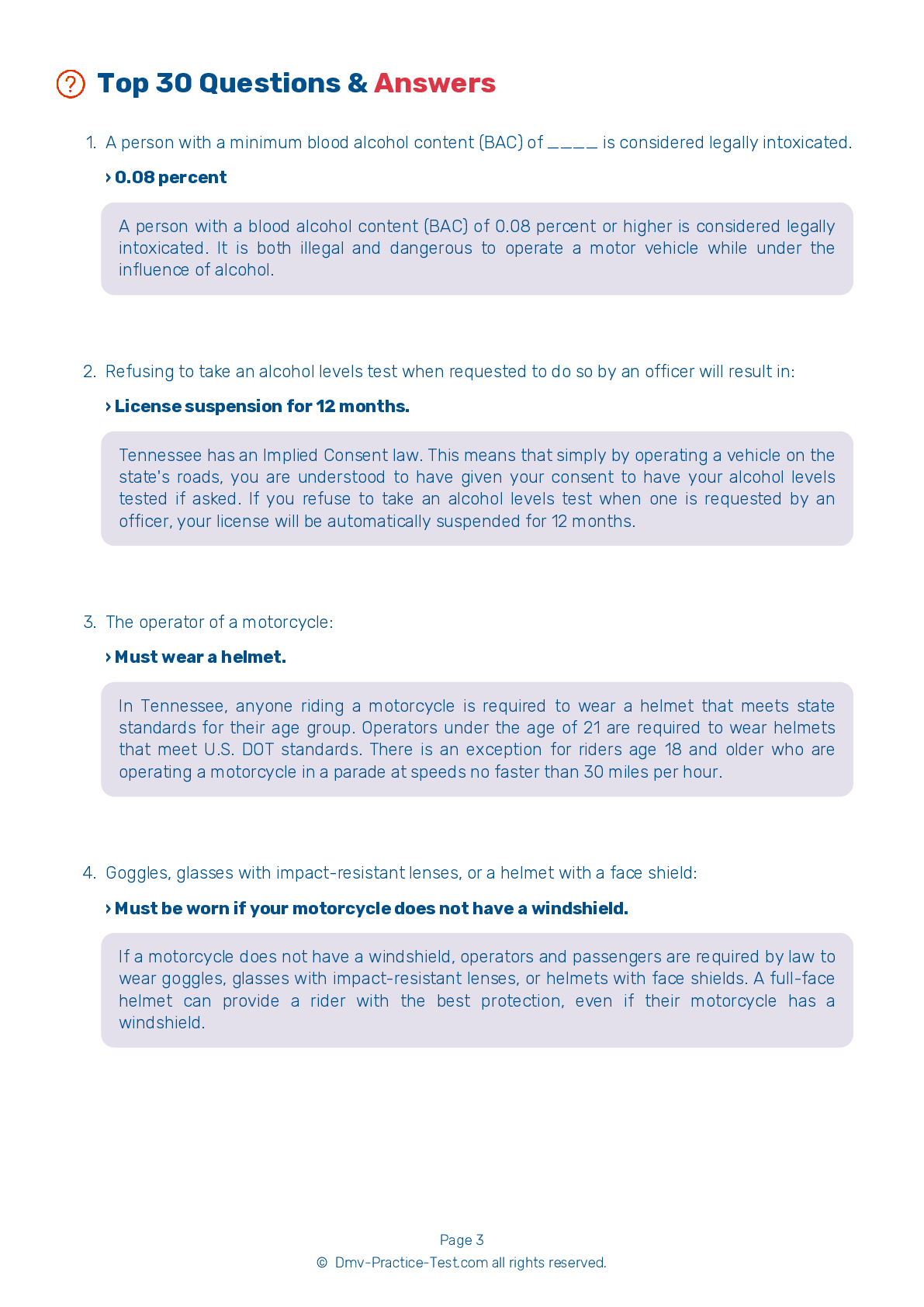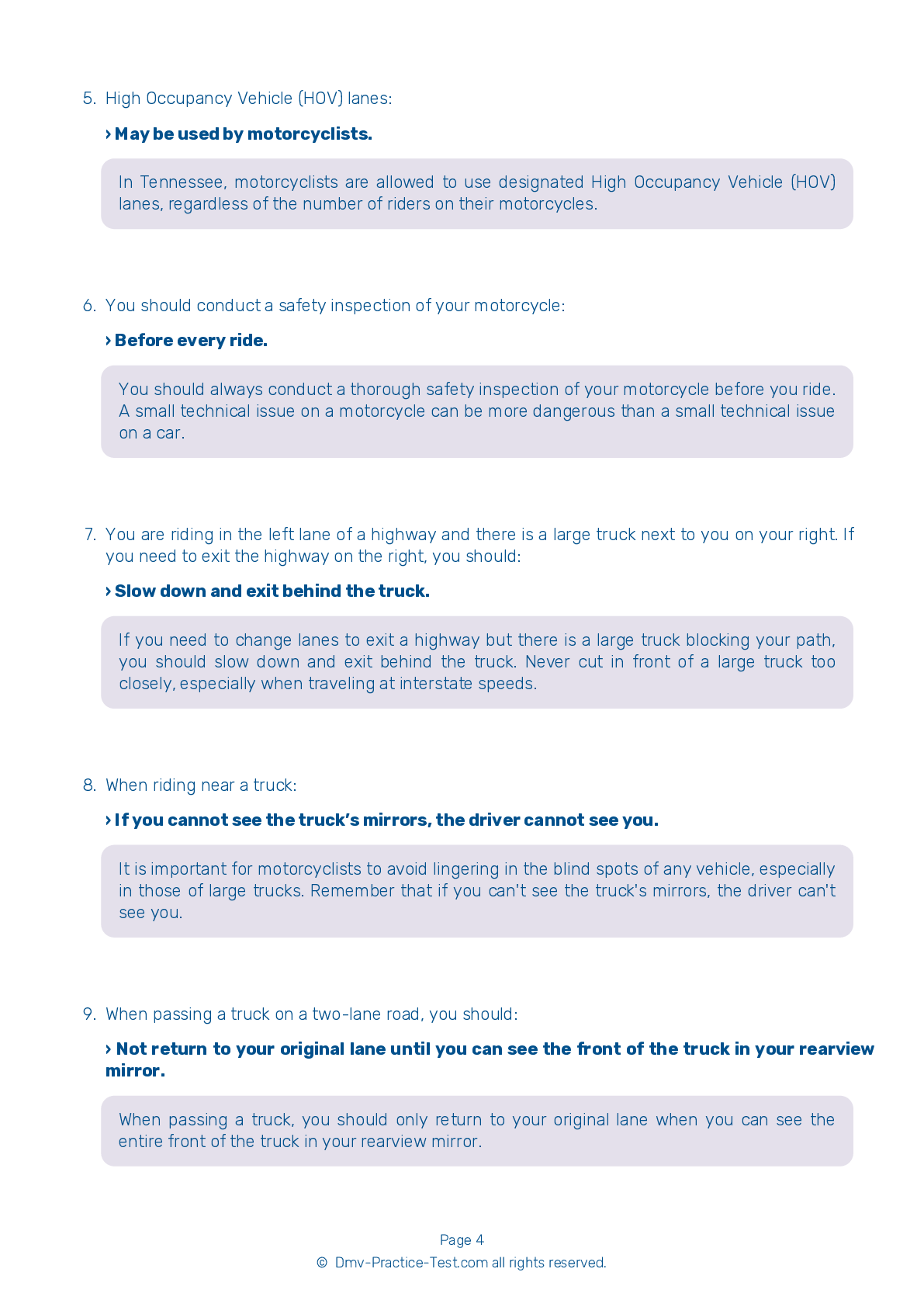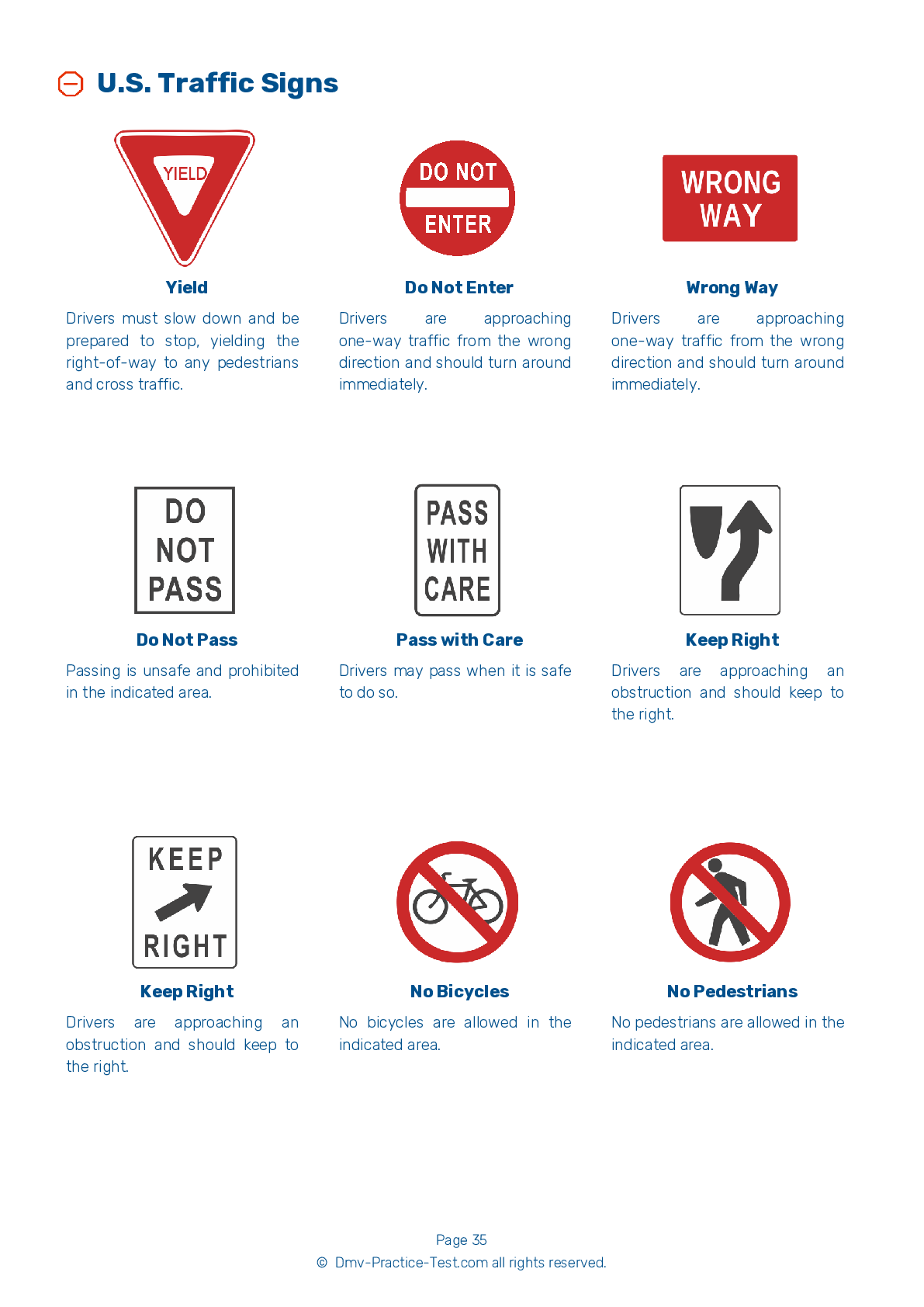DMV Permit Test #11
Motorcycle Test | License TN 2026 | FREE Online Practice! #11
Take this FREE motorcycle test (license in TN 2026) to check your knowledge of the road rules. To improve your results, download a motorcycle handbook online, study theory, and practice for free on our website. Still worried about how to get a motorcycle license in Tennessee in 2026? Check our website for more sample tests, train as much as possible, and boost your grades!
30
24
16
1 . When turning a three-wheeled motorcycle, there is a tendency for:
During a turn, inertia causes the motorcycle's center of gravity to shift sideways and outward toward the tip-over line. The reduced weight over the opposite side wheel can cause it to lift slightly. The tendency of the rear inside wheel to lift when turning is greater with increased speed.
2 . When being passed by another vehicle, motorcyclists should be alert to:
When being passed, motorcyclists should be careful not to be hit by any part of the passing vehicle, including its mirrors. In addition to the vehicle itself, motorcyclists should also be aware of wind gusts coming from the passing vehicle and potential objects being thrown by a passenger in the vehicle who may not be paying attention to the road.
3 . When looking through a turn, you should:
Look through every turn by turning just your head, not your shoulders, and keeping your eyes level with the horizon.
4 . If braking in a curve:
It is possible to use both brakes while turning, but it must be done with great care. Some of the usual traction is being used to make the turn while the motorcycle is leaning, so less traction is available for stopping.
5 . It can be difficult to ride right after it starts raining because:
Pavement can be particularly slippery after it has just started to rain. Oil from vehicles will have not yet washed away from the surface of the road, forming a slippery mixture with the water.
6 . Which material provides the best protection in the case of a crash?
Clothing made of sturdy leather or synthetic materials provide riders the best protection in the case of an accident. Riders should wear long pants and jackets while riding.
7 . When a lead rider is bending their left arm at the elbow, pointing upward, and swinging their arm toward their helmet, it means:
Hand signals are an important part of communication when riding in groups. When the lead rider's left arm is positioned for a right turn and swinging toward their helmet, it means the riders should pull off the road.
Need Motorcycle Insurance? No problem!
Compare the best rates in Tennessee and find a personalized policy that meets your needs.
1. Are You Currently insured ?
2. Married ?
3. Do you own your Home?
4. Have you or a Family Member Honorably Served in U.S. Military ?
5. Your Name
6. Age
7. Zip code
Ranked by best match
2026 Tennessee | Frequently Asked Questions
In Tennessee, to acquire a motorcycle driver's license, you must first pass a written test to obtain a motorcycle learner's permit. After 30 days and having practiced driving, you can take a road skills test. Upon passing, you'll receive your motorcycle endorsement. If you're under 18, you must also complete a Motorcycle Rider Education Program.
In Tennessee, the minimum age to obtain a motorcycle driver's license is 16 years old. However, if you're under 18, you'll need to have a valid regular driver's license or learner's permit for at least a year with no traffic violations, and your parent or guardian must sign a consent form. You'll also need to pass the necessary motorcycle written and skills tests.
Yes, you do need a dedicated license for motorcycle riding in Tennessee. You can either add a motorcycle endorsement to your existing Tennessee driver's license or obtain a separate motorcycle-only license. To get these, you must pass a vision screening, knowledge exam, and road skills test specific to motorcycle operation.
When applying for a motorcycle driver's license in Tennessee, you'll need a primary and secondary form of identification such as a birth certificate and social security card. Also, proof of Tennessee residency, U.S. Citizenship or lawful permanent resident status is required. If you're under 18, you'll need a Minor/Teenage Affidavit and Cancellation form signed by your parent or guardian.
Yes, you will need to take a written exam to obtain a motorcycle license in Tennessee. The exam tests your knowledge of motorcycle operation and safety. However, if you successfully complete a Motorcycle Rider Education Program (MREP), you may be exempted from this written test and the on-cycle skills test.
The motorcycle written test in Tennessee covers a range of topics including road rules for motorcycles, safe riding practices, and identifying and reacting to dangerous situations. It also tests knowledge on motorcycle parts, their functions, and maintenance. This information is found in the Tennessee Comprehensive Driver License Manual, specifically in the Motorcycle Operator Manual section.
Yes, in Tennessee, successfully completing a state-approved Motorcycle Rider Education Program (MREP) can waive the written and skills test required for motorcycle licensing. After completion, you'll receive a certificate which you can present at a Driver Services Center within six months to get your motorcycle endorsement.
To enroll in a motorcycle training course in Tennessee, you need to find a state-approved provider, such as a local community college or a private company. Then, register for the course, which typically involves paying a fee. The course usually includes classroom instruction and hands-on training. Upon completion, you may be eligible for license testing waivers or insurance discounts.
No, you don't need to possess your own motorcycle for the license test in Tennessee. You can use any motorcycle that is registered, insured, and meets all state safety standards. However, it's crucial that you're familiar and comfortable with the motorcycle's operations to successfully pass the test.
Yes, you can use a friend's motorcycle for the driver's license test in Tennessee, as long as the motorcycle is properly registered, insured, and passes a safety inspection. Remember to bring proof of insurance and registration to the test. Also, ensure you're familiar with the motorcycle's operation before your test.
Yes, in Tennessee, the motorcycle driving exam tests specific handling skills like starting and stopping, turning and swerving, and quick stops. It also assesses your ability to balance at low speeds, negotiate obstacles, and use both hand and foot controls effectively. Knowledge of traffic rules and safety measures related to motorcycling is also tested.
Yes, in Tennessee, new motorcycle drivers under the age of 18 are subject to restrictions. They must hold a motorcycle learner's permit for a minimum of 180 days, cannot carry passengers, and are prohibited from riding between the hours of 10 p.m. and 4 a.m. These restrictions are lifted once the driver turns 18.
Yes, your Tennessee motorcycle license allows you to operate a motorcycle in other states. However, you must comply with the traffic laws of the state you are in. Make sure to check the specific motorcycle laws of any states you plan to visit, as they may vary.
Yes, in Tennessee, it's mandatory for all motorcycle riders and passengers to wear a helmet. The law applies to any type of motorcycle, including scooters, mopeds, and motorbikes. The helmet must meet federal motor vehicle safety standards and should be equipped with both chin and neck straps.
In Tennessee, there are two types of motorcycle licenses: a "Class M Limited" for 125cc or less motorcycles, and a "Class M" for motorcycles over 125cc. The type of license you apply for depends on the type of motorcycle you plan to drive. Make sure to study the appropriate materials for the type of license you're seeking.
Yes, in Tennessee, you can add supplementary endorsements to your motorcycle license. This can include additional qualifications like a commercial driver's license (CDL). However, each endorsement may require additional tests or fees. It's recommended to consult with the Department of Safety and Homeland Security for specific information.
Yes, in Tennessee, the motorcycle license test can be taken in several languages other than English. However, it's important to contact your local DMV office to confirm which languages are available as this can vary by location. This ensures everyone, regardless of their native language, can understand and complete the test.
An effective strategy for preparing for the Tennessee motorcycle license test is to thoroughly study the Tennessee Motorcycle Operator Manual. This manual covers all the information that will be on the test. Practice tests are also available online to help you familiarize yourself with the format and types of questions asked. Regular review and practice can greatly improve your chances of passing.
Yes, in Tennessee, the motorcycle written exam can be taken in languages other than English. The exam is available in multiple languages to accommodate a diverse range of applicants. However, it's advisable to confirm the available options with your local DMV office as the offered languages may vary.
If you don't pass the motorcycle written test in Tennessee, you're allowed to retake it. However, there is a waiting period of one day before you can retake the test. It's recommended to study the Tennessee Motorcycle Operator Manual thoroughly before attempting again to increase your chances of passing.



